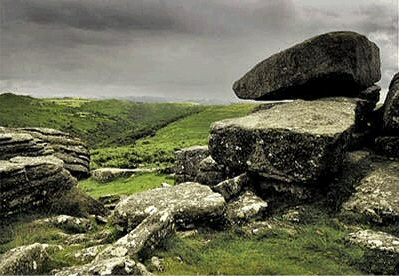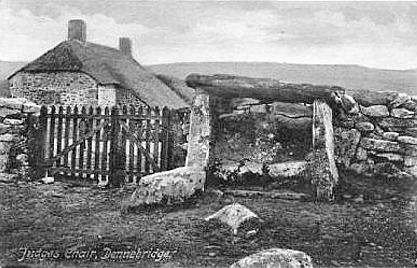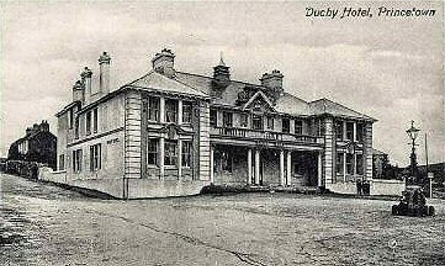
Here’s another nostalgic trip across Dartmoor from 141 years ago written by an anonymous author who clearly had a love and deep knowledge of Dartmoor. In some ways he lamented the passing of the ‘old ways’ whilst casting an eye to the future prospects of the Moor. From this account it is easy to see how progress made drastic changes to the lives of Dartmoor folk largely due to the coming of the railways. It is also interesting to note how at the time technological advances drastically altered the lives of ordinary folk working in the woollen mills of the time.
“To have knowledge of Dartmoor and form a correct opinion of its merits one should reside on the Moor for some years at least, and make himself acquainted with every detail, jotting down any new ideas that have come to his notice. You cannot hurry over Dartmoor and take notice of what is required at full gallop. You must jog about in the valleys and dales and take notice of the soil, grass, and ferns growing there, &c., and the cattle grazing of it. If you make but slow progress you will very likely be all the better pleased at the end of the week, simply because what you have done has been properly done.
To do this I propose to start from South Brent, taking with us good Moors men and a light pick axe. We can then dig and examine the nature of the soil as often as we like along our route. Taking a nearly a northerly course we are soon on the moor proper, with Pew and Shell Top to the west some miles, having the Erme River on our left, and the Avon on our right. We are crossing Brent Moor for Erme Head, which is now in view before us. The Erme, with its green valleys and the beautiful Erme Plains, with Old Broad Rock in the distance, will arouse one to a sense of duty towards his future king and fellow countrymen. Here we have miles in extent of beautiful plains or grazing lands, with its sweet rippling streams slowly winding their way to the ocean. These beautiful plains are neglected at present. It was here on these plains Mr. Waycott of Brook Farm, reared and kept his splendid flock of Dartmoor sheep, which sold for high prices about three years since. Having satisfied ourselves of the merits of this great plain, and the nature of the soil as well, we turn down the valley a short distance, then up Redda brook (Red Lake) – that ever favourite nook of the fox hunter. Within a short space of time we are in the Avon with Michelmore’s Warren (Huntingdon Warren) before us. Make a stand point here, and with your glass take a view south down the course of the river. You can from here see along the plains of the Avon towards Dock Hill (Dockwell Ridge) and Limson (Zempson?), with Lambsdown and Hayford away to the east – all plain fertile land, but few rocks or bogs, and it is almost the cream of Dartmoor to the fox hunter from Piles (Copse) to the Avon and thence to Brookwood has been the bone of contention with our gentlemen in red on more than one occasion. The plains before Huntingdon Ford are well adapted (and easily fenced) for all farming purposes, and now with the aid of the Buckfastleigh Railway, lime and other manures can be brought in cheap. We are now on the south and south-eastern slopes of Dartmoor, with the South Devon Railway not far in the distance, and the Buckfastleigh Mills and Tanneries in the valley beyond. Those mills and tanneries have grown immensely within the last few years, and completely shut out the old spinning wheel and bobbins. The Buckfast Mills, thanks to Messrs. Hamlyn and Co,. employ hundreds of operatives, and pays thousands of pounds yearly in wages and rents. Those gentlemen contribute a large sum yearly to rates and taxes, and give the farmers of the district long prices for wool, hides and grain. Turning north up the valley of Huntingdon, and by keeping a mid-hill course of a couple of miles we are shortly onto Black Lane, from thence to Fox Tor Hill (Ter Hill?); on reaching this I propose a rest for a while. From this point you have a glorious view of Mid Dartmoor to perfection, with Princetown in the distance. Before you and far away to the east you have Holne Moor and Compsin Tor (Combeshead Tor) and coppices. From this hilltop, Fox Tor, in my early days, could have been seen the old pack horse, with his pack saddle and crooks, loaded with two barrels of cider of 12 gallons in each, one on either side of old Dobbin, their position being parallel with the horse. They were returning from Buckfast and Holne over the Moor to Walkhampton or Sheepstor with cider. In those days 3 or 4 horses would be engaged to bring a hogshead of cider from Buckfast to the home farm. Now it is placed in a railway truck at Buckfast and sent to our nearest railway station in a few hours. It was necessary in those days to make a friendly party of several teams to fetch cider, because we often got bogged and required help, having provided oneself with a shovel (no spades then), and supposing Dobbin got bogged, he was soon dug out, reloaded and away. Such was our mode of cider fetching.

We now start from Compsin Tors to Dartmeet and Dartmeet Bridge with Brimpts nearby, and mark the progress made at Brimpts of late years. Here is a great fact, and I invite an inspection. It was in those old cottages at Dartmeet, old Tom Caunter, the veteran fisherman and otter hunter once did dwell. Who didn’t know old Tom, he had fished the Dart from its fountainhead to the sea, and most other streams of the moor as well. Up the hillside at Brimpts you are quickly standing erect before Bellever Farm, here then you will be repaid for your long walk, you will see Dartmoor cattle and sheep to perfection, and you will be surprised to find such a dairy of milch cows, in this nook of Dartmoor.
‘Twas here in years gone by could have been seen the piping geese and salmon on the good old table at Bellever at Christmastide. We now return towards Fox Tor passing on our way several small enclosures and over an extensive range of uncultivated Moorlands, sweet in blue heatherbell. On reaching Dunnerbridge we have the forest cattle pounds, on the of which the late Mr. Coaker of Belliver, in his official capacity as Reeve of the Forest, on a certain day named by the council of H.R.H. the Prince of Wales, would in a strong clear voice not to be mistaken proclaim “Oh yes! Oh, yes!! Oh, yes, !!! &c.

We are at Dunnerbridge and almost in the midst of the best Moor farms such as Huccaby, Sherbiten, Exworthy (Hexworthy), Brown berry, Prince Hall and Bogland (now Moorlands Farm), with their large numbers of cattle and sheep. We cross the West dart and are on to Swincombe and note the new enclosures going on towards Tor Royal newtake. There are extensive plains for a long distance here which are easily fenced into suitable fields, and facing south having a beautiful aspect in this quite well-watered nook of the Moor. There are many good dairy cattle and cows to be seen along this valley as you go along on old Swincombe, and one will not be surprised at the crossing of this murmuring stream if you “jaze a salmon,” but the watchers are about and we must proceed upstream to Whiteworks, turning the corner by Fox Tor brook we are on Whiteworks with its white mine burrow clear before you, which has made very good progress as late, a good stock of cattle and many acres of Moorland being brought into cultivation.
Pitcott (Peat Cott) has grown to a decent little Moor farm, and can boast of a good stock of cows and cattle; whilst at Castle Gate, towards Tor Royal, new cottages have grown into existence, and the Moor once a “Peat bog,” is now showing a comfortable farm enclosure rich in grass. It is to this fact I wish to call attention, and to make a stand point; we live in a great and free country, and on Dartmoor we possess tens of thousands of acres of productive land, which nature seems to have laid out in its most beautiful form, the valleys possess the ever silvery stream and brooks of the purest water and the hills and plains the purest air. Those vast plains then, the property of H.R.H the Prince of Wales, are capable with but little expense to the State of producing an immense addition to the yearly income to H.R.H the Prince of Wales, or bringing the revenue of the Duchy up to what it can and aught to be – an increase of £50,000 per annum over and above its present returns. If, the, the Government will not grant State aid, to improve and make profitable the Duchy estate, let us have fair and equitable leases for a certain period of time. There would be no difficulty in this way of raising capital and making Dartmoor all that can be desired. As Duchy Steward, (Mr. Charles Barrington) we have amongst us a gentleman of great experience of Dartmoor, extending over a period of nearly 40 years. He is perfectly acquainted with all our wants, and at all times ready to lend a helping hand to those who require his advice and assistance. We have to contribute our mite in rates and taxes; this is all right and proper, but yet we leave the Duchy property neglected, and we have but a faint idea of raising an extra £50,000 per annum off the Duchy estates. We won’t vote a few thousands for a railway to Dartmoor, so that the resources of this “wild and wondrous region,” may and shall be developed. We are told how rapidly the population of this country increases, and that we are at our wit’s end to provide them with food and employment; and that we live in an age of great progress and enlightenment. Is this possible? Surely, if we cannot “see” our way clear to bring the Duchy property of Dartmoor into a great state of profitable return, we are only worthy to be classed with those of darker ages. To show our friends what can be done on Dartmoor in shape of roots and vegetables, we can get up a cottage garden show for Dartmoor alone, and we might have a store cattle show, towards the end of the summer, exclusively for cattle bred and kept on tenant moor farms; we could invite landed proprietors and gentlemen farmers to come and join with us; those gentlemen would see our wants and necessities. The Duchy Hotel will be found replete and comfortable in every way, and the worthy hostess and family, I am quite sure would make all agreeable and comfortable. We are told by Dr. Oxland of Plymouth, the vegetables there are very far from good, and there is seldom good fruit to be had at Plymouth market. I think we can do in vegetables at any rate better than this. Let us try.

I am asked what I know of Dartmoor. Well, I knew the Duchy Hotel, Princetown, when occupied by host Worth – when in the front room, on the right in entering the hotel from the Plymouth road, over the granite steps (now the shop and counter of the High Dartmoor Visitor Centre), was hung around with the prepared and well-preserved stuffed skins of otters, foxes, badgers, and polecats &c. You would be informed by mine host of the great battles fought and won by the hounds Hector, Pincher, Spite, and Teasey, either at Mistor, Fox Tor or some other noted cover. I have trotted over rocks and bogs of the good old Moor a great deal of 55 years, and have taken my salmon and peel, in days gone by, from its murmuring streams, as well as a few snipe and “black cock,” too, from the brown heath of the Moor. In fact -“I have enjoyed the sweet smell of the blue heatherbell, And drank of the glorious old Swincombe as well, I have tripp’d over yon plains both early and late, And do not despair of Dartmoor yet.” – The Crow of Mistor.” – The Tavistock Gazette, March 9th, 1877.
As can be seen there were many changes happening in 1877 and it appears in some cases not quickly enough for the author. Today it’s easy to look back and see that despite many heroic and expensive attempts Dartmoor never became the ‘Garden of Devon’. One simply has to look at the deserted farmsteads, enclosures, newtakes to realise that the majority of the the Duchy lands were and are only able to accommodate livestock enterprises. Having read the account of how in order to get one’s supply of cider it involved an arduous long trek with packhorses how much easier it became when the hogsheads were simply put on a train. However, there is a hint that the author missed the “friendly parties” who with their packhorse trains and the adventures had leading them through moor and mire.
One dramatic change that today would deeply offend most people is that of what was the Duchy Hotel. Today this building serves as the pride of the Dartmoor National Park and serves as a visitor centre. Imagine climbing those granite steps and opening the huge glass doors to be confronted with; “well-preserved stuffed skins of otters, foxes, badgers, and polecats.” Who knows maybe the ghosts of those victims of long gone otter and fox hounds today forlornly look down on photos and toy replicas of their species thinking that they were born far too early?
Finally the first paragraph of this account superbly sums up how to become acquainted with Dartmoor – slowly and steadily as you go, taking in all that surrounds you, so much so that over time you get to know the Moor as well as your best friend. William Crossing once noted how overtime he knew exactly where he was simply by feeling the ground under his feet and that only came about by years of getting to know the very landscape.
 Legendary Dartmoor The many aspects past and present of Dartmoor
Legendary Dartmoor The many aspects past and present of Dartmoor

Hello, I am curious about a family tale. My Mother and I used to visit her cousin Rose who lived in Dousland in the 1970s. There was a tale cousin Rose would tell about her Uncle Jack. He for some reason, apparently led a donkey, wearing a pair of ladies bloomers on it’s head, up the aisle of Widecombe church during Sunday service. I don’t know what his surname would have been as the only relatives I knew were women who had married and did dismiss the tale as nonsense. However since the 1970s I have learned that there really is nowt so queer as folk. So I am wondering if it might be true. My guess is that if it occurred would be around the turn of the 19th to 20th century. Do you know of any such tale or rumour please?